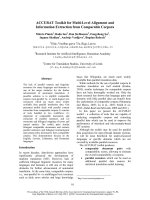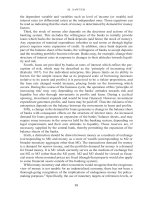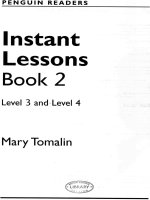(Level 3 and up) essays from examiners 2020 task 2
Bạn đang xem bản rút gọn của tài liệu. Xem và tải ngay bản đầy đủ của tài liệu tại đây (903.72 KB, 153 trang )
EDITION
2020
Version
1
A Collection of 120+ Essays of Different Topics
IELTS ESSAYS
FROM EXAMINERS
Task 2
COLLECTED BY
DAVID KOWIE
Essays From Examiners
Contents
Foreword................................................................................................................................................... 7
Simon-ielts ............................................................................................................................................................... 8
1.
Festivals............................................................................................................................................. 9
2.
Extreme sports ................................................................................................................................ 10
3.
Responsibilities of businesses ......................................................................................................... 11
4.
Climate change................................................................................................................................ 12
5.
Online news .................................................................................................................................... 13
6.
Crimes ............................................................................................................................................. 14
7.
Old and New.................................................................................................................................... 15
8.
Wild animals.................................................................................................................................... 16
9.
Child Education ............................................................................................................................... 17
10.
Celebrities ................................................................................................................................... 18
11.
Job and Money ............................................................................................................................ 19
12.
Hobbies ....................................................................................................................................... 20
13.
Hobbies – trends or not .............................................................................................................. 21
14.
Historical sites ............................................................................................................................. 22
15.
Unpaid work ................................................................................................................................ 23
16.
Communities ............................................................................................................................... 24
17.
Male versus Female in Unis ........................................................................................................ 25
18.
Cultures and Advances................................................................................................................ 26
19.
Advertising .................................................................................................................................. 27
20.
History & Literature .................................................................................................................... 28
21.
Parental care ............................................................................................................................... 29
22.
Salaries ........................................................................................................................................ 30
23.
Economic goals versus other goals ............................................................................................. 31
24.
Minority Languages..................................................................................................................... 32
25.
University students ..................................................................................................................... 33
26.
Punishments to drivers ............................................................................................................... 34
27.
People’s relationships ................................................................................................................. 35
28.
Financial support to artists ......................................................................................................... 36
January 1, 2020
2
Essays From Examiners
29.
Animal testing ............................................................................................................................. 37
30.
Higher education versus work .................................................................................................... 38
31.
Museums..................................................................................................................................... 39
32.
Living alone ................................................................................................................................. 40
33.
Living alone or in small families .................................................................................................. 41
34.
Video games ................................................................................................................................ 42
35.
Credit cards ................................................................................................................................. 43
36.
Online courses............................................................................................................................. 44
37.
Life expectancy ........................................................................................................................... 45
38.
Environmental problems ............................................................................................................ 46
39.
Foreign films................................................................................................................................ 47
40.
Parental roles .............................................................................................................................. 48
41.
Happiness .................................................................................................................................... 49
42.
Economic progress ...................................................................................................................... 50
43.
The roles of music ....................................................................................................................... 51
44.
Technology versus people’s interaction ..................................................................................... 52
45.
Career path ................................................................................................................................. 53
46.
Equality ....................................................................................................................................... 54
47.
Genetic engineering .................................................................................................................... 55
48.
Choices ........................................................................................................................................ 56
49.
Artificial Intelligence ................................................................................................................... 57
50.
True power of advertising ........................................................................................................... 58
HowtodoIELTS.com ............................................................................................................................................ 59
51.
Work-life balance ........................................................................................................................ 60
52.
Choices ........................................................................................................................................ 61
53.
Population & Young People ........................................................................................................ 62
54.
Foreign languages ....................................................................................................................... 63
55.
Sporting events ........................................................................................................................... 64
56.
Traffic and housing...................................................................................................................... 65
57.
Museums and galleries 1 ............................................................................................................ 66
58.
Museums and galleries 2 ............................................................................................................ 67
January 1, 2020
3
Essays From Examiners
59.
Literature .................................................................................................................................... 68
60.
Buildings ...................................................................................................................................... 69
61.
Plastic bags .................................................................................................................................. 70
62.
Big cities ...................................................................................................................................... 71
63.
Online meetings .......................................................................................................................... 72
64.
Leadership ................................................................................................................................... 73
65.
Climate change............................................................................................................................ 74
66.
History versus science ................................................................................................................. 75
67.
Agriculture versus hunger ........................................................................................................... 77
68.
Newspaper versus the Internet .................................................................................................. 79
69.
Age for driving ............................................................................................................................. 80
70.
Fast public transport ................................................................................................................... 81
71.
Sharing information .................................................................................................................... 82
72.
Situation acceptance ................................................................................................................... 83
73.
Environmental Problems............................................................................................................. 84
74.
Self-employed versus company .................................................................................................. 85
75.
Music ........................................................................................................................................... 86
76.
Responsibility for health ............................................................................................................. 87
77.
Police and crime rates ................................................................................................................. 89
78.
Young people leaving home........................................................................................................ 90
79.
Throwaway society ..................................................................................................................... 91
80.
Smoking....................................................................................................................................... 92
81.
Housing for the poor ................................................................................................................... 93
82.
Studying abroad .......................................................................................................................... 94
83.
Changing jobs .............................................................................................................................. 95
84.
Animal testing ............................................................................................................................. 96
85.
Ideal society ................................................................................................................................ 97
86.
Prison versus Education .............................................................................................................. 98
87.
Internet for culture learning ....................................................................................................... 99
88.
Stress ......................................................................................................................................... 100
89.
Advertising - influences............................................................................................................. 101
January 1, 2020
4
Essays From Examiners
90.
Choices for children .................................................................................................................. 102
91.
Hunger....................................................................................................................................... 103
92.
Academic versus practical......................................................................................................... 104
93.
Recycling ................................................................................................................................... 105
94.
Shopping malls versus sports facilities...................................................................................... 106
95.
Children being less active.......................................................................................................... 107
96.
Filmmaking ................................................................................................................................ 108
97.
Buying cars ................................................................................................................................ 109
98.
Gyms ......................................................................................................................................... 110
Cambridge IELTS............................................................................................................................................... 111
99.
Happiness .................................................................................................................................. 112
100.
Student behavior....................................................................................................................... 113
101.
Gap year .................................................................................................................................... 114
102.
Personalities .............................................................................................................................. 115
103.
Sport stars ................................................................................................................................. 116
104.
Changes ..................................................................................................................................... 117
105.
Nature or Nurture ..................................................................................................................... 118
106.
Parents vs schools ..................................................................................................................... 119
107.
Petrol price ................................................................................................................................ 120
108.
Foreign languages ..................................................................................................................... 121
109.
Public health ............................................................................................................................. 122
110.
Child punishment ...................................................................................................................... 123
111.
Cultural homogeneity ............................................................................................................... 124
Pauline Cullen .................................................................................................................................................... 125
112.
Recycling 1 ................................................................................................................................ 126
113.
Recycling 2 ................................................................................................................................ 127
114.
Recycling 3 ................................................................................................................................ 128
115.
Jobs & Skills ............................................................................................................................... 129
116.
Crime rates 1 ............................................................................................................................. 130
117.
Crime rates 2 ............................................................................................................................. 131
118.
The media ................................................................................................................................. 132
January 1, 2020
5
Essays From Examiners
119.
Free education and healthcare ................................................................................................. 133
120.
Obesity ...................................................................................................................................... 134
121.
Alternative energy .................................................................................................................... 135
122.
Tourism ..................................................................................................................................... 136
Macmillan ............................................................................................................................................................ 137
123.
Traffic congestion...................................................................................................................... 138
124.
Globalisation and Cities ............................................................................................................ 139
125.
Technology as a Study Tool ....................................................................................................... 140
126.
Worsened Environment ............................................................................................................ 141
127.
Experience versus Knowledge................................................................................................... 142
128.
Old Buildings versus New Buildings .......................................................................................... 143
129.
Soft Skills ................................................................................................................................... 144
130.
Technology in Arts .................................................................................................................... 145
131.
Business Responsibilities........................................................................................................... 146
132.
Science versus computer technology ....................................................................................... 147
133.
Budget for healthcare ............................................................................................................... 148
134.
Aging poulation ......................................................................................................................... 149
135.
Salary and job satisfaction ........................................................................................................ 150
136.
dependency on technology....................................................................................................... 151
137.
Preserving cultures ................................................................................................................... 152
January 1, 2020
6
Essays From Examiners
Foreword
Nghiên cứu bài mẫu IELTS là một nhu cầu không thể thiếu của những sĩ tử tham gia kì thi này. Thị
trường bài mẫu hiện nay khá rộng lớn với nhiều tài liệu sách, bài viết mẫu trên mạng. Tuy đa dạng
là thế, nhưng người học IELTS cũng khơng khỏi bối rối vì độ tin cậy và tính chuẩn mực về ngôn ngữ
của các bài viết trên mạng, bài nào cũng tự xem là “chuẩn” hay “band 8+”.
Nhằm mang đến người học IELTS những bài mẫu chuẩn mực nhất từ các nguồn chuẩn nhất, đội ngũ
“Luyện viết IELTS Writing 9.0+” đã cho ra mắt tập tài liệu “Essay From Examiners” này. Sách là sự
tổng hợp bài mẫu đến từ các nguồn chính:
•
Thầy Simon
•
HowtodoIELTS.com (Ex-examiners)
•
Cambridge IELTS
•
Cơ Pauline Cullen
•
Bài mẫu từ sách của nhà xuất bản Macmillan (Ready for IELTS 2nd Edition, Improve your
Skills Writing for IELTS)
Hi vọng quyển sách này sẽ giúp đỡ được các bạn phần nào trong con đường tiến đến một band điểm
cao trong kì thi IELTS Writing.
Thân ái,
David Kowie
January 1, 2020
7
Essays From Examiners
Simon-ielts
January 1, 2020
8
Essays From Examiners
1. Festivals
Most people have forgotten the meaning behind traditional or religious festivals;
during festival periods, people nowadays only want to enjoy themselves.
To what extent do you agree or disagree with this opinion?
Some people argue that we no longer remember the original meaning of festivals, and that
most of us treat them as opportunities to have fun. While I agree that enjoyment seems to
be the priority during festival times, I do not agree that people have forgotten what these
festivals mean.
On the one hand, religious and traditional festivals have certainly become times for
celebration. In the UK, Christmas is a good example of a festival period when people are
most concerned with shopping, giving and receiving presents, decorating their homes and
enjoying traditional meals with their families. Most people look forward to Christmas as a
holiday period, rather than a time to practise religion. Similar behaviour can be seen during
non-religious festivals, such as Bonfire Night. People associate this occasion with making
fires, watching firework displays, and perhaps going to large events in local parks; in other
words, enjoyment is people’s primary goal.
However, I disagree with the idea that the underlying meaning of such festivals has been
forgotten. In UK primary schools, children learn in detail about the religious reasons for
celebrating Christmas, Easter and a variety of festivals in other religions. For example, in
late December, children sing Christmas songs which have a religious content, and they may
even perform nativity plays telling the story of Jesus’ birth. Families also play a role in
passing knowledge of religious festivals’ deeper significance on to the next generation. The
same is true for festivals that have a historical background, such as Bonfire Night or
Halloween, in the sense that people generally learn the stories behind these occasions at an
early age.
In conclusion, although people mainly want to enjoy themselves during festivals, I believe
that they are still aware of the reasons for these celebrations.
January 1, 2020
9
Essays From Examiners
2. Extreme sports
Extreme sports such as sky diving and skiing are very dangerous and should be
banned.
To what extent do you agree or disagree with this view?
In recent years, extreme sports have become increasingly popular, and some people argue
that governments should prohibit them. I completely disagree with the idea that these
sports are too dangerous, and I therefore believe that they should not be banned.
In my opinion, so-called extreme sports are not as dangerous as many people think. All
sports involve some element of risk, and there should always be clear regulations and
safety procedures to reduce the possibility of accidents. People who take part in extreme
sports are usually required to undergo appropriate training so that the dangers are
minimised. For example, anyone who wants to try skydiving will need to sign up for lessons
with a registered club, and beginners are not allowed to dive solo; they must be
accompanied by an experienced professional. Finally, the protective equipment and
technology used in sports from motor racing to mountain climbing is constantly improving
safety.
While I support regulations and safety measures, I believe that it would be wrong, and
almost impossible, to ban extreme sports. In the first place, we should all be free to decide
how we spend our leisure time; as long as we understand the risks, I do not believe that
politicians should stop us from enjoying ourselves. However, an even stronger argument
against such a ban would be the difficulty of enforcing it. Many of the most risky sports, like
base jumping or big wave surfing, are practised far away from the reach of any authorities.
I cannot imagine the police being called to stop people from parachuting off a mountain
face or surfing on an isolated beach.
In conclusion, I would argue that people should be free to enjoy extreme sports as long as
they understand the risks and take the appropriate precautions.
January 1, 2020
10
Essays From Examiners
3. Responsibilities of businesses
As well as making money, businesses also have social responsibilities.
To what extent do you agree or disagree?
Businesses have always sought to make a profit, but it is becoming increasingly common to
hear people talk about the social obligations that companies have. I completely agree with
the idea that businesses should do more for society than simply make money.
On the one hand, I accept that businesses must make money in order to survive in a
competitive world. It seems logical that the priority of any company should be to cover its
running costs, such as employees’ wages and payments for buildings and utilities. On top of
these costs, companies also need to invest in improvements and innovations if they wish to
remain successful. If a company is unable to pay its bills or meet the changing needs of
customers, any concerns about social responsibilities become irrelevant. In other words, a
company can only make a positive contribution to society if it is in good financial health.
On the other hand, companies should not be run with the sole aim of maximising profit;
they have a wider role to play in society. One social obligation that owners and managers
have is to treat their employees well, rather than exploiting them. For example, they could
pay a “living wage” to ensure that workers have a good quality of life. I also like the idea
that businesses could use a proportion of their profits to support local charities,
environmental projects or education initiatives. Finally, instead of trying to minimise their
tax payments by using accounting loopholes, I believe that company bosses should be
happy to contribute to society through the tax system.
In conclusion, I believe that companies should place as much importance on their social
responsibilities as they do on their financial objectives.
January 1, 2020
11
Essays From Examiners
4. Climate change
Some people think that instead of preventing climate change, we need to find a way
to live with it.
To what extent do you agree or disagree?
Climate change represents a major threat to life on Earth, but some people argue that we
need to accept it rather than try to stop it. I completely disagree with this opinion, because I
believe that we still have time to tackle this issue and reduce the human impact on the
Earth's climate.
There are various measures that governments and individuals could take to prevent, or at
least mitigate, climate change. Governments could introduce laws to limit the carbon
dioxide emissions that lead to global warming. They could impose “green taxes” on drivers,
airline companies and other polluters, and they could invest in renewable energy
production from solar, wind or water power. As individuals, we should also try to limit our
contribution to climate change, by becoming more energy efficient, by flying less, and by
using bicycles and public transport. Furthermore, the public can affect the actions of
governments by voting for politicians who propose to tackle climate change, rather than for
those who would prefer to ignore it.
If instead of taking the above measures we simply try to live with climate change, I believe
that the consequences will be disastrous. To give just one example, I am not optimistic that
we would be able to cope with even a small rise in sea levels. Millions of people would be
displaced by flooding, particularly in countries that do not have the means to safeguard
low-lying areas. These people would lose their homes and their jobs, and they would be
forced to migrate to nearby cities or perhaps to other countries. The potential for human
suffering would be huge, and it is likely that we would see outbreaks of disease and famine,
as well as increased homelessness and poverty.
In conclusion, it is clear to me that we must address the problem of climate change, and I
disagree with those who argue that we can find ways to live with it.
January 1, 2020
12
Essays From Examiners
5. Online news
Although more and more people read news on the Internet, newspaper will remain
the most important source of news.
Do you agree or disagree?
The Internet is beginning to rival newspapers as the best place to find information about
what is happening in the world. I believe that this trend will continue, and the Internet will
soon be just as important as the traditional ones.
On the one hand, I believe that newspapers will continue to be a vital source of information,
even in the Internet age. Firstly, newspapers are the most traditional means of
communicating the news, and not everyone wants to or is able to use the Internet instead.
For example, old people or those in rural areas might not have the ability of opportunity to
get online, while many of us simply prefer newspapers even if we do have Internet access.
Secondly, newspapers can be trusted as reliable sources of news because they employ
professional journalists and editors. Finally, many people like the experience of holding and
reading a paper rather than looking at a computer screen.
However, the Internet is likely to become just as popular as newspapers for a variety of
reasons. The main reason is that it allows us much faster access to news in real time and
wherever we are, on different gadgets and mobile devices. Another key benefit of online
news compared to newspapers is the ability to share articles, discuss them with other
people, give our views, and even contribute with our own updates on social media. For
example, there has been an explosion in the use of platforms like Twitter and YouTube
where anyone can share their news and views. A final point is that this source of news is
less damaging to the environment.
In conclusion, I disagree with the view that newspapers will continue to be the main source
of news, because I believe that the Internet will soon be equally important.
January 1, 2020
13
Essays From Examiners
6. Crimes
Some people who have been in prison become good citizens later, and it is often
argued that these are the best people to talk to teenagers about the dangers of
committing a crime.
To what extent do you agree or disagree?
It is true that ex-prisoners can become normal, productive members of society. I
completely agree with the idea that allowing such people to speak to teenagers about their
experiences is the best way to discourage them from breaking the law.
In my opinion, teenagers are more likely to accept advice from someone who can speak
from experience. Reformed offenders can tell young people about how they became
involved in crime, the dangers of a criminal lifestyle, and what life in prison is really like.
They can also dispel any ideas that teenagers may have about criminals leading glamorous
lives. While adolescents are often indifferent to the guidance given by older people, I
imagine that most of them would be extremely keen to hear the stories of an ex¬offender.
The vivid and perhaps shocking nature of these stories is likely to have a powerful impact.
The alternatives to using reformed criminals to educate teenagers about crime would be
much less effective. One option would be for police officers to visit schools and talk to
young people. This could be useful in terms of informing teens about what happens to
lawbreakers when they are caught, but young people are often reluctant to take advice
from figures of authority. A second option would be for school teachers to speak to their
students about crime, but I doubt that students would see teachers as credible sources of
information about this topic. Finally, educational films might be informative, but there
would be no opportunity for young people to interact and ask questions.
In conclusion, I fully support the view that people who have turned their lives around after
serving a prison sentence could help to deter teenagers from committing crimes.
January 1, 2020
14
Essays From Examiners
7. Old and New
The older generations tend to have very traditional ideas about how people should
live, think and behave. However, some people believe that these ideas are not helpful
in preparing younger generations for modern life.
To what extent do you agree or disagree with this view?
It is true that many older people believe in traditional values that often seem incompatible
with the needs of younger people. While I agree that some traditional ideas are outdated,
I believe that others are still useful and should not be forgotten.
On the one hand, many of the ideas that elderly people have about life are becoming less
relevant for younger people. In the past, for example, people were advised to learn a
profession and find a secure job for life, but today’s workers expect much more variety and
diversity from their careers. At the same time, the ‘rules’ around relationships are being
eroded as young adults make their own choices about who and when to marry. But perhaps
the greatest disparity between the generations can be seen in their attitudes towards
gender roles. The traditional roles of men and women, as breadwinners and housewives,
are no longer accepted as necessary or appropriate by most younger people.
On the other hand, some traditional views and values are certainly applicable to the
modern world. For example, older generations attach great importance to working hard,
doing one’s best, and taking pride in one’s work, and these behaviours can surely benefit
young people as they enter today’s competitive job market. Other characteristics that are
perhaps seen as traditional are politeness and good manners. In our globalised world,
young adults can expect to come into contact with people from a huge variety of
backgrounds, and it is more important than ever to treat others with respect. Finally, I
believe that young people would lead happier lives if they had a more ‘old-fashioned’ sense
of community and neighbourliness.
In conclusion, although the views of older people may sometimes seem unhelpful in today’s
world, we should not dismiss all traditional ideas as irrelevant.
January 1, 2020
15
Essays From Examiners
8. Wild animals
Wild animals have no place in the 21st century, so protecting them is a waste of
resources.
To what extent do you agree or disagree?
Some people argue that it is pointless to spend money on the protection of wild animals
because we humans have no need for them. I completely disagree with this point of view.
In my opinion, it is absurd to argue that wild animals have no place in the 21st century. I do
not believe that planet Earth exists only for the benefit of humans, and there is nothing
special about this particular century that means that we suddenly have the right to allow or
encourage the extinction of any species. Furthermore, there is no compelling reason why
we should let animals die out. We do not need to exploit or destroy every last square metre
of land in order to feed or accommodate the world’s population. There is plenty of room for
us to exist side by side with wild animals, and this should be our aim.
I also disagree with the idea that protecting animals is a waste of resources. It is usually the
protection of natural habitats that ensures the survival of wild animals, and most scientists
agree that these habitats are also crucial for human survival. For example, rainforests
produce oxygen, absorb carbon dioxide and stabilise the Earth’s climate. If we destroyed
these areas, the costs of managing the resulting changes to our planet would far outweigh
the costs of conservation. By protecting wild animals and their habitats, we maintain the
natural balance of all life on Earth.
In conclusion, we have no right to decide whether or not wild animals should exist, and I
believe that we should do everything we can to protect them.
January 1, 2020
16
Essays From Examiners
9. Child Education
Families who send their children to private schools should not be required to pay
taxes that support the state education system.
To what extent do you agree or disagree with this statement?
Some people believe that parents of children who attend private schools should not need to
contribute to state schools through taxes. Personally, I completely disagree with this view.
For a variety of reasons, it would be wrong to reduce taxes for families who pay for private
education. Firstly, it would be difficult to calculate the correct amount of tax reduction for
these families, and staff would be required to manage this complex process. Secondly, we
all pay a certain amount of tax for public services that we may not use. For example, most
people are fortunate enough not to have to call the police or fire brigade at any time in their
lives, but they would not expect a tax reduction for this. Finally, if wealthy families were
given a tax discount for sending their children to private schools, we might have a situation
where poorer people pay higher taxes than the rich.
In my opinion, we should all be happy to pay our share of the money that supports public
schools. It is beneficial for all members of society to have a high quality education system
with equal opportunities for all young people. This will result in a well-educated workforce,
and in turn a more productive and prosperous nation. Parents of children in private
schools may also see the advantages of this in their own lives. For example, a company
owner will need well qualified and competent staff, and a well-funded education system
can provide such employees.
In conclusion, I do not believe that any financial concessions should be made for people
who choose private education.
January 1, 2020
17
Essays From Examiners
10.
Celebrities
Nowadays celebrities are more famous for their glamour and wealth than for their
achievements, and this sets a bad example to young people.
To what extent do you agree or disagree with this statement?
It is true that some celebrities are known for their glamorous lifestyles rather than for the
work they do. While I agree that these celebrities set a bad example for children, I believe
that other famous people act as positive role models.
On the one hand, many people do achieve fame without really working for it. They may
have inherited money from parents, married a famous or wealthy person, or they may have
appeared in gossip magazines or on a reality TV programme. A good example would be
Paris Hilton, who is rich and famous for the wrong reasons. She spends her time attending
parties and nightclubs, and her behaviour promotes the idea that appearance, glamour and
media profile are more important than hard work and good character. The message to
young people is that success can be achieved easily, and that school work is not necessary.
On the other hand, there are at least as many celebrities whose accomplishments make
them excellent role models for young people. Actors, musicians and sports stars become
famous idols because they have worked hard and applied themselves to develop real skills
and abilities. They demonstrate great effort, determination and ambition, which is required
for someone who wants to be truly successful in their chosen field. An example is the actor
and martial artist Jackie Chan, who has become world famous through years of practice and
hard work. This kind of self-made celebrity can inspire children to develop their talents
through application and perseverance.
In conclusion, it seems to me that the influence of celebrities on young people can be
positive as well as negative.
January 1, 2020
18
Essays From Examiners
11.
Job and Money
When choosing a job, the salary is the most important consideration.
To what extent do you agree or disagree?
Many people choose their jobs based on the size of the salary offered. Personally, I disagree
with the idea that money is the key consideration when deciding on a career, because I
believe that other factors are equally important.
On the one hand, I agree that money is necessary in order for people to meet their basic
needs. For example, we all need money to pay for housing, food, bills, health care, and
education. Most people consider it a priority to at least earn a salary that allows them to
cover these needs and have a reasonable quality of life. If people chose their jobs based on
enjoyment or other non-financial factors, they might find it difficult to support themselves.
Artists and musicians, for instance, are known for choosing a career path that they love, but
that does not always provide them with enough money to live comfortably and raise a
family.
Nevertheless, I believe that other considerations are just as important as what we earn in
our jobs. Firstly, personal relationships and the atmosphere in a workplace are extremely
important when choosing a job. Having a good manager or friendly colleagues, for example,
can make a huge difference to workers’ levels of happiness and general quality of life.
Secondly, many people’s feelings of job satisfaction come from their professional
achievements, the skills they learn, and the position they reach, rather than the money they
earn. Finally, some people choose a career because they want to help others and contribute
something positive to society.
In conclusion, while salaries certainly affect people’s choice of profession, I do not believe
that money outweighs all other motivators.
January 1, 2020
19
Essays From Examiners
12.
Hobbies
Some people believe that hobbies need to be difficult to be enjoyable.
To what extent do you agree or disagree?
Some hobbies are relatively easy, while others present more of a challenge. Personally, I
believe that both types of hobby can be fun, and I therefore disagree with the statement
that hobbies need to be difficult in order to be enjoyable.
On the one hand, many people enjoy easy hobbies. One example of an activity that is easy
for most people is swimming. This hobby requires very little equipment, it is simple to
learn, and it is inexpensive. I remember learning to swim at my local swimming pool when I
was a child, and it never felt like a demanding or challenging experience. Another hobby
that I find easy and fun is photography. In my opinion, anyone can take interesting pictures
without knowing too much about the technicalities of operating a camera. Despite being
straightforward, taking photos is a satisfying activity.
On the other hand, difficult hobbies can sometimes be more exciting. If an activity is more
challenging, we might feel a greater sense of satisfaction when we manage to do it
successfully. For example, film editing is a hobby that requires a high level of knowledge
and expertise. In my case, it took me around two years before I became competent at this
activity, but now I enjoy it much more than I did when I started. I believe that many
hobbies give us more pleasure when we reach a higher level of performance because the
results are better and the feeling of achievement is greater.
In conclusion, simple hobbies can be fun and relaxing, but difficult hobbies can be equally
pleasurable for different reasons.
January 1, 2020
20
Essays From Examiners
13.
Hobbies – trends or not
Popular hobbies and interests change over time and are more a reflection of trends
and fashions than an indication of what individuals really want to do in their spare
time. To what extent do you agree or disagree?
Some leisure activities become fashionable for a short time and then disappear when a new
trend comes along, whereas others seem to be perennially popular. I can therefore only
partly agree with the assertion that hobbies reflect changing fashions rather than our true
interests.
On the one hand, it is true that many hobbies are simply passing trends. Children and
teenagers, in particular, are attracted to whatever activity is currently popular among their
peers. My 10-year-old niece, for example, seems to have a new interest every month, as she
joins in with the latest craze that sweeps through her primary school. Over the last year or
so, she has been obsessed with Rubik’s cubes, fidget spinners, squidgies and slime. In a
similar way, there have been several different fitness trends for adults over recent years,
from jogging to yoga to circuit training, and I doubt whether the majority of participants
continued to enjoy those activities in the long term.
On the other hand, many people spend their free time doing popular activities that are far
from trendy. One good example would be the game chess. Children and adults who enjoy
playing chess are certainly not following a new fashion or wasting their time on something
that they do not truly like. On the contrary, they are passionate about a game that has
existed for hundreds of years, and they find it inherently fascinating and absorbing. I would
say the same about many other hobbies, from reading to swimming.
In conclusion, while some people are attracted to the latest fashionable hobby, others
choose their pastimes for more genuine reasons.
January 1, 2020
21
Essays From Examiners
14.
Historical sites
Foreign visitors should pay more than local visitors for cultural and historical
attractions.
To what extent do you agree or disagree with this opinion?
It is sometimes argued that tourists from overseas should be charged more than local
residents to visit important sites and monuments. I completely disagree with this idea.
The argument in favour of higher prices for foreign tourists would be that cultural or
historical attractions often depend on state subsidies to keep them going, which means that
the resident population already pays money to these sites through the tax system.
However, I believe this to be a very shortsighted view. Foreign tourists contribute to the
economy of the host country with the money they spend on a wide range of goods and
services, including food, souvenirs, accommodation and travel. The governments and
inhabitants of every country should be happy to subsidise important tourist sites and
encourage people from the rest of the world to visit them.
If travellers realised that they would have to pay more to visit historical and cultural
attractions in a particular nation, they would perhaps decide not to go to that country on
holiday. To take the UK as an example, the tourism industry and many related jobs rely on
visitors coming to the country to see places like Windsor Castle or Saint Paul’s Cathedral.
These two sites charge the same price regardless of nationality, and this helps to promote
the nation’s cultural heritage. If overseas tourists stopped coming due to higher prices,
there would be a risk of insufficient funding for the maintenance of these important
buildings.
In conclusion, I believe that every effort should be made to attract tourists from overseas,
and it would be counterproductive to make them pay more than local residents.
January 1, 2020
22
Essays From Examiners
15.
Unpaid work
Some people think that all teenagers should be required to do unpaid work in their
free time to help the local community. They believe this would benefit both the
individual teenager and society as a whole.
Do you agree or disagree?
Many young people work on a volunteer basis, and this can only be beneficial for both the
individual and society as a whole. However, I do not agree that we should therefore force
all teenagers to do unpaid work.
Most young people are already under enough pressure with their studies, without being
given the added responsibility of working in their spare time. School is just as demanding
as a full-time job, and teachers expect their students to do homework and exam revision on
top of attending lessons every day. When young people do have some free time, we should
encourage them to enjoy it with their friends or to spend it doing sports and other leisure
activities. They have many years of work ahead of them when they finish their studies.
At the same time, I do not believe that society has anything to gain from obliging young
people to do unpaid work. In fact, I would argue that it goes against the values of a free and
fair society to force a group of people to do something against their will. Doing this can only
lead to resentment amongst young people, who would feel that they were being used, and
parents, who would not want to be told how to raise their children. Currently, nobody is
forced to volunteer, and this is surely the best system.
In conclusion, teenagers may choose to work for free and help others, but in my opinion we
should not make this compulsory.
January 1, 2020
23
Essays From Examiners
16.
Communities
We cannot help everyone in the world that needs help, so we should only be
concerned with our own communities and countries.
To what extent do you agree or disagree with this statement?
Some people believe that we should not help people in other countries as long as there are
problems in our own society. I disagree with this view because I believe that we should try
to help as many people as possible.
On the one hand, I accept that it is important to help our neighbours and fellow citizens. In
most communities there are people who are impoverished or disadvantaged in some way.
It is possible to find homeless people, for example, in even the wealthiest of cities, and for
those who are concerned about this problem, there are usually opportunities to volunteer
time or give money to support these people. In the UK, people can help in a variety of ways,
from donating clothing to serving free food in a soup kitchen. As the problems are on our
doorstep, and there are obvious ways to help, I can understand why some people feel that
we should prioritise local charity.
At the same time, I believe that we have an obligation to help those who live beyond our
national borders. In some countries the problems that people face are much more serious
than those in our own communities, and it is often even easier to help. For example, when
children are dying from curable diseases in African countries, governments and individuals
in richer countries can save lives simply by paying for vaccines that already exist. A small
donation to an international charity might have a much greater impact than helping in our
local area.
In conclusion, it is true that we cannot help everyone, but in my opinion national
boundaries should not stop us from helping those who are in need.
January 1, 2020
24
Essays From Examiners
17.
Male versus Female in Unis
Universities should accept equal numbers of male and female students in every
subject.
To what extent do you agree or disagree?
In my opinion, men and women should have the same educational opportunities. However,
I do not agree with the idea of accepting equal proportions of each gender in every
university subject.
Having the same number of men and women on all degree courses is simply unrealistic.
Student numbers on any course depend on the applications that the institution receives. If
a university decided to fill courses with equal numbers of males and females, it would need
enough applicants of each gender. In reality, many courses are more popular with one
gender than the other, and it would not be practical to aim for equal proportions. For
example, nursing courses tend to attract more female applicants, and it would be difficult to
fill these courses if fifty per cent of the places needed to go to males.
Apart from the practical concerns expressed above, I also believe that it would be unfair to
base admission to university courses on gender. Universities should continue to select the
best candidates for each course according to their qualifications. In this way, both men and
women have the same opportunities, and applicants know that they will be successful if
they work hard to achieve good grades at school. If a female student is the best candidate
for a place on a course, it is surely wrong to reject her in favour of a male student with
lower grades or fewer qualifications.
In conclusion, the selection of university students should be based on merit, and it would
be both impractical and unfair to change to a selection procedure based on gender.
January 1, 2020
25









